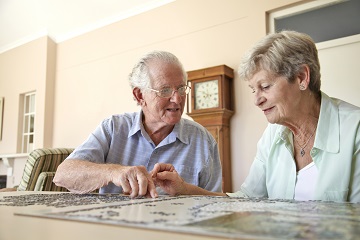Alzheimer's disease and dementia
 Alzheimer’s disease isn’t a normal part of growing older. Although it is true that most people with the disease are 65 and older, people younger than 65 can also have early-onset Alzheimer’s disease. It’s the most common cause of dementia that, over time, becomes worse. The symptoms, in most cases, develop slowly and becomes so severe that it may interfere with daily tasks.
Alzheimer’s disease isn’t a normal part of growing older. Although it is true that most people with the disease are 65 and older, people younger than 65 can also have early-onset Alzheimer’s disease. It’s the most common cause of dementia that, over time, becomes worse. The symptoms, in most cases, develop slowly and becomes so severe that it may interfere with daily tasks.
There’s a difference between dementia and Alzheimer’s disease and they aren’t the same. Dementia is a term that’s used to describe symptoms that influence memory, communication abilities and performance of daily activities. Alzheimer’s disease is the most common type of dementia.
Signs and symptoms of Alzheimer’s
- Memory loss: Becoming more forgetful and forgetting important dates and events. Most people see memory loss as an indicator of Alzheimer’s but this on its own can be a symptom of other illnesses.
- Difficulty solving problems and planning: An indication of this may be if the person starts having problems with their finances, such as paying monthly bills. They may also struggle to develop and follow a plan of action.
- Struggling to finish familiar tasks: The person may find it difficult to concentrate and routine tasks may start taking longer as the disease progresses.
- Difficulty with time and space: This is a common symptom of Alzheimer’s disease. The person loses track of days and becoming more forgetful about where they are, how they got there and why they’re there.
- Personality and mood changes
- Finding it difficult to understand what people are saying or finding the right words
Is there a cure?
Most forms of Alzheimer’s disease and dementia can’t be cured, although research is continuing into developing drugs, vaccines and treatments.
In recent years new drugs have been developed that relieve some of the symptoms of Alzheimer's disease in the early stages.
 How to care for someone with Alzheimer’s disease and dementia
How to care for someone with Alzheimer’s disease and dementia
Alzheimer’s disease and dementia don’t only affect the person with the disease but have a significant impact on everyone around the person. Taking care of someone with Alzheimer’s disease and dementia can take a mental, emotional and physical toll. Caregivers will need a good support network and will need to take breaks from their caregiving duties.
Caring for a person with Alzheimer’s and dementia
Alzheimer’s South Africa offers the following advice for caregivers:
Dressing and personal care: The dignity and the feelings of the person should always be considered. Find general tips, a possible routine you can use and clothing tips for easy dressing here.
Washing and bathing: Respect their need to be alone while they wash but sometimes they don’t want to wash. Here’s information on how to reason with a person who doesn’t want to bath/wash, preventing accidents in the bathroom and tips for bathing or washing.
Keeping the home safe: While trying to keep the person as independent as possible, there are some practical ways to safeguarding the home to prevent falls, poisons and fires.
Nutrition and Dementia: Ensure that the person eats healthy and nutritious meals. There may be issues with food and mealtimes as the disease progresses. Learn more about the possible emotional, physical and environmental factors for problems with eating.
How to communicate: As the disease progresses, it, may become more difficult for the person to communicate. They may just mumble, not speak at all or the things they say do not make sense. Learn how to communicate, speak or listen to the person.
Keeping busy: Encourage them to do things for themselves. Keeping busy will increase their quality of life. Find out why planned activities are important and what to consider when you’re planning activities.
Everyday care: The dignity of the person should always be considered. They may not be able to tell you that they’re embarrassed. Here are some practical tips on helping the person out of a chair, safety, moving and lifting, and pressure sores (bed sores).
 Unusual behaviour: Alzheimer’s disease can cause someone to display unpredictable or unusual behaviour. This may include severe mood swings, repetition of words, wandering, combativeness or verbal and physical aggression. This behaviour isn’t done on purpose. Find out how to get support, ways of coping, dealing with the person’s wandering, preventing aggression and incontinence, etc.
Unusual behaviour: Alzheimer’s disease can cause someone to display unpredictable or unusual behaviour. This may include severe mood swings, repetition of words, wandering, combativeness or verbal and physical aggression. This behaviour isn’t done on purpose. Find out how to get support, ways of coping, dealing with the person’s wandering, preventing aggression and incontinence, etc.
It’s important to see to your needs and emotions. As a caregiver you may be dealing with the following:
- Guilt
- Loneliness
- Anger
- Grief
Here’s some practical advice from Alzheimer’s South Africa to help you cope. Dementia SA has hints for caregivers of those living with dementia.
For support and more information contact:
Alzheimer’s South Africa
National helpline: 0860 102 681
Website:
https://alzheimers.org.za/
Alzheimer’s South Africa: Western Cape
Southern Cape
Tel: 044 877 0417
Fax: 044 877 0417
Email: managersc@alzheimers.org.za
Regional Manager: Hettie Theron
Western Cape
Tel: 082 669 7600
Fax: 086 238 5366
Email: managerwc@alzheimers.org.za
Regional Manager: Jill Robson
DementiaSA
National helpline: 0860 636 679
Website: https://www.dementiasa.org/
Contact numbers:
Tel: 021 421 0077/0078 or 021 418 5888
Cell: 076 470 5511
Fax: 021 418 2772
General email: info@dementiasa.org
Social worker email: support@dementiasa.org


